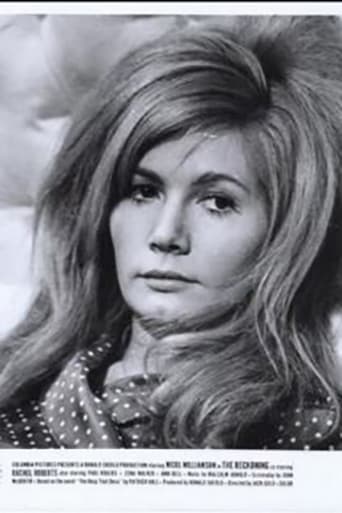Alicia
I love this movie so much
VividSimon
Simply Perfect
Comwayon
A Disappointing Continuation
FuzzyTagz
If the ambition is to provide two hours of instantly forgettable, popcorn-munching escapism, it succeeds.
George Mainwaring
This 2005 film stars 'Auf Wiedersehen Pet' actor Timothy Spall as Britain's most efficient and prolific hangman, Albert Pierrepoint.Grocery man Albert, married to Annie (Juliet Stevenson), lives a fairly normal life, except his Father and Uncle are hangmen. In 1932, the time comes for Albert to follow in the family footsteps. He manages his early jobs without gaining recognition, such as the execution of the murderer Dorothea Waddingham (Lizzie Hopley). By 1945, Albert has gained a reputation as the most efficient hangman in the country, leading to him being selected to fly to Germany and carry out the execution of around 200 Nazi war criminals, due to their part in the Holocaust. He becomes well known in the British press, seen by the newspapers as something of a hero. But how will the quiet Albert deal with this sudden fame and will it affect his ability to pull off capital punishment?This was a powerful bit of cinema, very thought provoking. As expected, Spall puts in an outstanding performance as Pierrepoint. I particularly liked his moral standards, such as during the day he had to execute thirteen Nazi war criminals. Only twelve coffins were at the prison and he was told just to put the last one 'in the ground'. He refuses to do this, stating this man has paid the price for what he's done and he will be buried with dignity. As predicted, Albert can't deal with the sudden rush of fame (both positive and negative publicity) and things come to a head when he executes his friend Tish (Eddie Marsan) who murdered his ex-girlfriend. He can no longer live with being a hangman and resigns.The film ends with a note saying Pierrepoint died an opponent of capital punishment. It didn't act as a deterrent, only a form of revenge. I have to say, I agree and am glad capital punishment was finally abolished in 1965. If one looks at the current case of Ian Brady, the Moors Murderer who clearly wants to die, then it is doing some good keeping him alive. Hanging would be way too good for him.
lastliberal
Timothy Spall (Peter Pettigrew from Harry Potter), Eddie Marsan, and Juliet Stevenson star in a film about a man (Spall) who follows in his father's footsteps to become the best hangman in England.What strikes you first is the detachment with which he does his job. He does not become personally involved, just do it quick and professional.Outside the job, he is a grocer, and a character that would never be connected with being a hangman: he sings and dances, and enjoys comedies.After he was chosen to execute 47 German prisoners of war, he changed. His identity became known, and he became the target of those who wished to abolish the death penalty.His calm composure starts to unravel little by little.His last two shown were the tipping point.Spall was outstanding in this film, and had great support from Marsan and Stevenson. It was an intelligent and captivating drama.
Rajesh Ray
"Pierrepoint: The Last Hangman" is a very well-directed and produced film that tries to delve into the character / psyche of Britain's most famous (although definitely not the last) hangman of the 20th century, Albert Pierrepoint, one who carries on the family tradition with great aplomb ! The performance by Timothy Spall in the lead role was brilliant. Spall succeeds in portraying a very positive image of Pierrepoint, a man of high personal values who adheres to a high code of conduct. The movie is based on Albert Pierrepoint's biography and conveys him as the "quintessential professional", who has a (rather unpleasant)job to do and is hell-bent on doing it to the very best of his abilities. The performances by Juliet Stevenson (as Pierrepoint's supportive but troubled wife) and Marsden (as his pub mate, "Tish") are also noteworthy.Throughout his more than two decades long "successful career",Pierrepont goes about his job with a high sense of professional detachment. He is not at all interested in knowing about or passing any judgements on the crimes of his condemned prisoners, whom he is required to despatch from this world. He is just focused on "their height, weight and physical condition" so that he can put an end to their lives in the quickest and most efficient manner; a thorough professional who takes immense pride in being the undoubted No. 1 in his vocation in the entire country.But then one day something happens which shakes his soul and makes him seriously contemplates the correctness of capital punishment and his key role in its implementation.It is indeed a very dark and gloomy film with several "trying" moments. A film that forces the viewer to think and stays with him / her long afterwards. What I really liked was the fact that the film does not take any overt position on capital punishment but yet forces one to think. The technical quality is of a high standard with the hanging scenes very authentically depicted.Recommended watching for the thoughtful viewer (with a strong stomach)!
didi-5
This film details the life and career of Albert Pierrepoint, the Lancashire hangman and owner of the pub 'Help the Poor Struggler' from the 1930s through to the 1960s. His profession is in the blood - following in his father's footsteps - but until the war he stayed anonymous, not even discussing matters with his wife.Timothy Spall does well in the lead, although the historical accuracy is questionable in places. As a character study it works well, but ultimately it is a fairly depressing watch. The quotation at the end makes clear that Pierrepoint did become disillusioned with his quick and dispassionate job, moving from pride in the speed of his work to the feeling that something is inherently wrong with one person causing another's life to end with deliberate calculation.Pierrepoint is a film which raises a lot of questions, but ultimately treats them in a superficial way. Historical cases well documented such as Evans and Ellis pass by without much note, which depersonalises them and makes their inclusion something of a lost opportunity.









